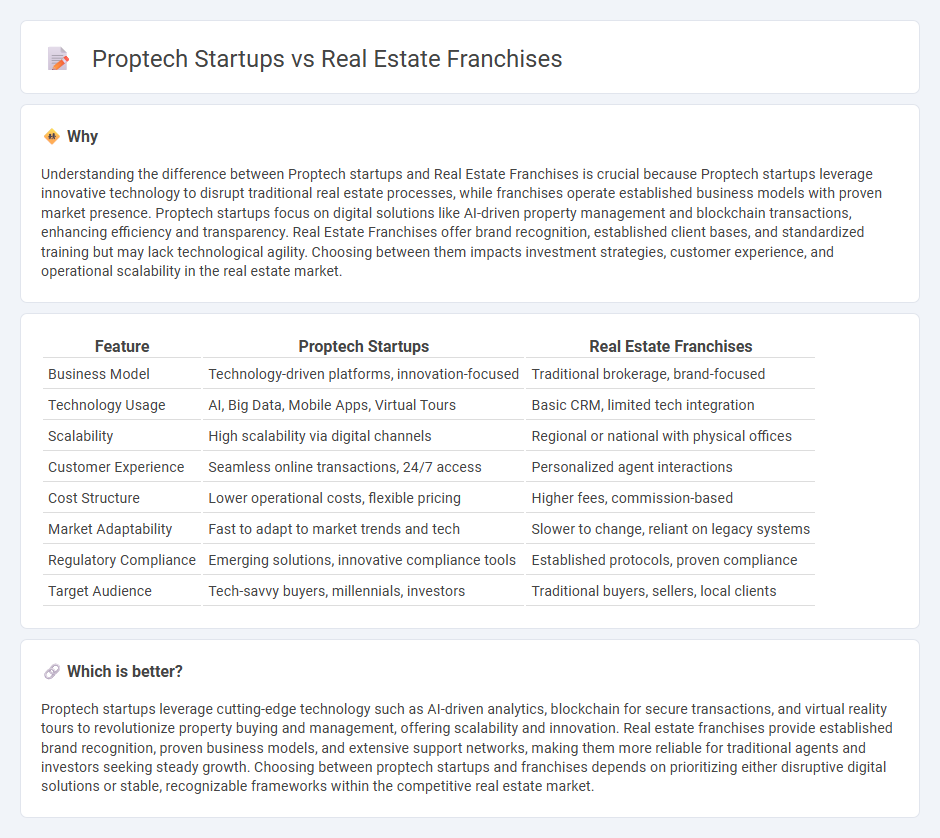
Proptech startups revolutionize real estate with innovative technology-driven solutions, enhancing property management, transactions, and customer experience through AI, blockchain, and virtual tours. Real estate franchises offer established brand recognition, extensive agent networks, and proven business models, providing stability and market presence. Discover how these two forces shape the future of real estate by exploring their distinct advantages and market impact.
Why it is important
Understanding the difference between Proptech startups and Real Estate Franchises is crucial because Proptech startups leverage innovative technology to disrupt traditional real estate processes, while franchises operate established business models with proven market presence. Proptech startups focus on digital solutions like AI-driven property management and blockchain transactions, enhancing efficiency and transparency. Real Estate Franchises offer brand recognition, established client bases, and standardized training but may lack technological agility. Choosing between them impacts investment strategies, customer experience, and operational scalability in the real estate market.
Comparison Table
| Feature | Proptech Startups | Real Estate Franchises |
|---|---|---|
| Business Model | Technology-driven platforms, innovation-focused | Traditional brokerage, brand-focused |
| Technology Usage | AI, Big Data, Mobile Apps, Virtual Tours | Basic CRM, limited tech integration |
| Scalability | High scalability via digital channels | Regional or national with physical offices |
| Customer Experience | Seamless online transactions, 24/7 access | Personalized agent interactions |
| Cost Structure | Lower operational costs, flexible pricing | Higher fees, commission-based |
| Market Adaptability | Fast to adapt to market trends and tech | Slower to change, reliant on legacy systems |
| Regulatory Compliance | Emerging solutions, innovative compliance tools | Established protocols, proven compliance |
| Target Audience | Tech-savvy buyers, millennials, investors | Traditional buyers, sellers, local clients |
Which is better?
Proptech startups leverage cutting-edge technology such as AI-driven analytics, blockchain for secure transactions, and virtual reality tours to revolutionize property buying and management, offering scalability and innovation. Real estate franchises provide established brand recognition, proven business models, and extensive support networks, making them more reliable for traditional agents and investors seeking steady growth. Choosing between proptech startups and franchises depends on prioritizing either disruptive digital solutions or stable, recognizable frameworks within the competitive real estate market.
Connection
Proptech startups leverage innovative technologies such as AI-driven analytics, virtual reality tours, and blockchain to revolutionize traditional real estate processes, which real estate franchises integrate to enhance operational efficiency and client engagement. Real estate franchises adopt proptech solutions to streamline property management, optimize marketing strategies, and provide data-driven insights, creating a competitive advantage in the market. This synergy accelerates digital transformation, fostering scalable growth and improved customer experiences across the real estate industry.
Key Terms
Business Model
Real estate franchises rely on established business models emphasizing brand recognition, standardized processes, and commission-based revenue structures, leveraging physical offices and agent networks. Proptech startups prioritize technology-driven models utilizing digital platforms, data analytics, and automation to enhance efficiency, scalability, and customer experience. Discover how these contrasting approaches transform the real estate landscape by exploring their unique business strategies in depth.
Technology Integration
Real estate franchises leverage established brand recognition and operational frameworks while gradually adopting technology for property listings, customer management, and virtual tours. Proptech startups prioritize tech innovation, utilizing AI, blockchain, and big data analytics to disrupt traditional real estate processes with enhanced efficiency and transparency. Explore how these contrasting approaches shape the future of real estate technology integration.
Brand Recognition
Real estate franchises benefit from strong brand recognition built over decades, offering consumers trust and reliability through established market presence and extensive networks. Proptech startups leverage innovative technology and data-driven solutions to rapidly disrupt traditional models, yet often lack the widespread brand awareness of heritage franchises. Explore how brand recognition shapes consumer preferences and competitive strategies in the evolving real estate landscape.
Source and External Links
Top Real Estate Franchises of 2025 (UPDATED RANKINGS) - The leading real estate franchises in 2025 include RE/MAX, Keller Williams, Century 21, ERA Real Estate, and HomeVestors, with RE/MAX having the largest global agent network and sales volume.
Real Estate Franchising | Realty ONE Group International - Realty ONE Group offers a unique lifestyle brand franchise model focusing on proprietary business systems, culture, technology, training, and marketing support to help franchisees grow their real estate businesses globally.
Real Estate Franchise Opportunities for Sale - Real estate franchises provide services for buying and selling property with benefits like brand awareness, marketing support, training, and software, and they have experienced growth boosted by increased housing demand, especially post-pandemic.
 dowidth.com
dowidth.com